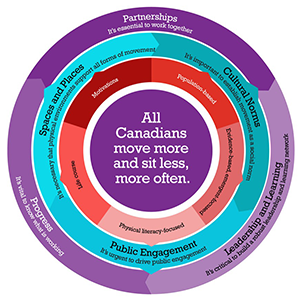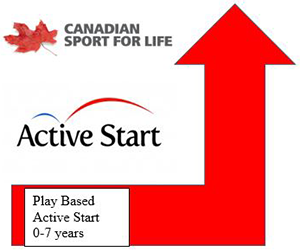Program Focus Areas
The Let’s Get Moving Nova Scotia is the provincial’s action plan to engage all Nova Scotians in physical activity. The action plan strives to make daily movement a priority and in particular, the program makes emphasis for young children to learn and explore movement more readily with the goal of young children becoming lifelong movers.
The Nova Scotia Department of Education and Early Childhood Development (EECD) and the Department of Communities, Cultures and Heritage (CCH) are collaborating to support more movement and physical active initiatives in the province. In particular, the government of Nova Scotia has developed a Before and After Pre-Primary program (BAPP) to provide opportunity for children to explore movement through active play. Specifically, the BAPP focuses on three core areas: physical literacy, movement and outdoor play.
The PACE program supports these government initiatives and prioritizes these three core areas in its program delivery. The intent is for our students to gain knowledge and experiential practice in the field in relation to BAPP’s core areas and develop specific skills in delivering movement and activity programs to young children upon graduation. In particular, the goal with PACE is for our students to gain competencies in the areas of physical literacy, movement and outdoor play.
In the PACE program, we define the three BAPP core areas as follows:
Physical Literacy is the motivation, confidence, physical competence, knowledge and understanding to value and take responsibility for engagement in physical activities (Whitehead, 2016).
Movement is categorized in the major classifications of space awareness, body awareness, locomotor and non-locomotor, qualities of movement and relationships (Pangrazi & Beighle, 2012).
Outdoor Play is understood as a space for children to explore multiple outdoor environments and participate in active movement where the body is moving at various intensities.
In addition, the PACE program aims to support the BAPP standards within its delivery. The BAPP standards include:
- Increase access to affordable, quality active play programming for children and their families
- Increase physical activity and movement in the early years.
- Increase opportunities for early childhood educators and recreation practitioners to enhance their awareness and skills related to movement, physical literacy and outdoor play.
- Establish requirements for unlicensed Before and After Pre-Primary programs provided through recreation organizations and have consistent shared standards for these organizations and for regulated child care providers.

Active Start
In addition, the PACE program utilizes Active Start principles that were developed by Canadian Sport for Life to further support young children in becoming competent young movers. Active Start is a movement program for children ages 0-7 years. Through play and movement, they develop the fundamental movement skills and learn how to link them together (Canadian Sport for Life, 2018).

Active Start Principles applied in PACE
- Physical activity should be a fun part of a child’s life every day and is essential for healthy child development.
- Opportunities for exploration of risk and limits in safe environments.
- Unstructured access to a wide variety of colourful materials and equipment.
- Activities should help children feel competent and comfortable participating in a variety of fun and challenging activities and non-competitive games.
- For children with a disability, access to age and disability-appropriate adapted equipment is an important contributor to success been physically active.
- Daily physical activity with an emphasis on fun.